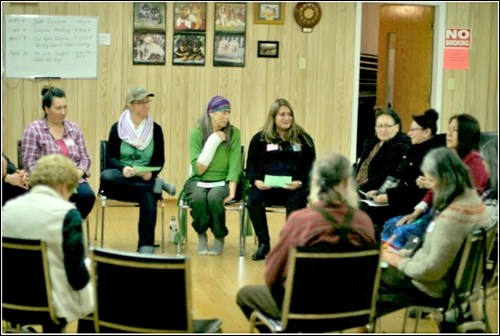Twenty individuals celebrated International Women’s Day on March 25 at the Pioneer Lodge in North Battleford.
The campaign theme this year was “Strength and Resilience of Indigenous Women.”
E. Pellitier from Paynton opened the evening with a prayer. A cold plate salad supper accompanied by fried chicken was shared. Marcella Pedersen, chair of the National Farmers Union Region No. 6’s Women’s Advisory Committee hosted the event with sponsorship provided by Status of Women Canada.
Speaking at the event, Pedersen informed attendees International Women’s Day’s inception. The first IWD was recognized and designated by the United Nations on March 8, 1975.
By bringing together native and non-native women socially Pedersen said she hoped to foster an understanding of one another to break breaking the pattern of racism, prejudice and injustice.
Pedersen said she the event was a way to bring people together to celebrate achievements while reminding others of the continued vigilance and action required to ensure women's equality is gained and maintained in all aspects of life.
Pedersen also referenced other causes gaining attention, stating that when the Idle No More Movement, missing and murdered women, truth and reconciliation hearings and Standing Rock are considered, indigenous voices are beginning to be heard.
“We are here today to make a difference; think globally but act locally,” Pedersen said.
“Make every day International Women's Day. Do your bit to ensure that the future for girls is bright, equal, safe and rewarding.”
Pedersen shared her childhood experience attending residential schools, recounting her feelings of low self-esteem. Pedersen was able to leave the residential school halfway through the school year, meaning she did not experience loss of identity, parents, language, culture or heritage that is common with other residential school stories.
“Is it any wonder that we have the problems we have today with that background, as well as government policies,” she asked those in attendance.
Pedersen said she learned people change only through suffering or by education.
“Indigenous peoples have suffered enough. We must move forward by educating ourselves of their struggles. We need First Nations peoples to teach us, but we have to be willing to listen.”
She also spoke of the need for forgiveness, both for the abusers and the self, in order for individuals to move on.
“We are only hurting ourselves. We won’t forget the abuse, but we can forgive, with our creator’s help to become stronger and more resilient. As Nelson Mandela says, ‘When a deep injury is done to us, we never heal until we forgive.’
“We must strive to be moved by a generosity of spirit that will enable us to outgrow the hatred and conflicts of the past. People must learn to hate, and if they can learn to hate, they can be taught to love, for love comes more naturally to the human heart than its opposite.”
Guest speaker J. Spyglass spoke about her struggles with memories of residential schools and how it had affected her life and family. Spyglass and her two brothers were picked up and put in the back of a station wagon and taken away. If one wet the bed, the child’s face was rubbed into it. One time a student threw up in his bowl and was forced continue eatingy. She lost her brother to tuberculosis during this time. But she is a survivor.
Eleanor Sunchild, a Cree lawyer from Thunderchild First Nation, has been practicing law for 12 years, and has worked extensively in the indigenous communities. She talked with passion of the many injustices done to residential school survivors and the Sixties Scoop victims and about the myth of colonization.
Sunchild spoke about the correlation between residential school survivors and suicide. She explained how the residential schools contributed to low self-esteem, anger, addictions, self-blame, lack of trust, PTSD, marginalization and intergenerational effects.
In a related topic, Sunchild said girls under 18 are most targeted when it comes to missing and murdered aboriginal women. According to the Native Women’s Association of Canada, 67 per cent of these missing women are murder victims while 20 per cent are missing. The problem is greatest on the Prairies. Ten per cent of the missing people in Canada are First Nation, while they account for only three per cent of the total population. Most are under 31 years of age and 17 per cent are under 18.
Sunchild said she would like to see more aboriginal women in the Senate, and as lawyers, social workers and students. Closing on a message of hope, she said communities are healing and women are influential in that healing. She claims they are the ones who have to break the cycles of oppression and pain.
Carma Albert of Sweet Grass First Nation spoke of women and achievement. She noted her family are successful farmers despite laws that did not allow First Nation farmers to get loans for crop production, machinery or other needs. They have been farming since 1921 with her children being the fourth generation of farmers.
Albert wondered if they were so successful because they hadn’t gone to residential schools. Her daughter, Lanie, had a successful career as an accountant until she suffered a stroke at the age of 30. Her son Albert has been physically challenged since childhood.
Albert credits her faith with seeing her through all her struggles.
The evening closed with door prizes and intermingling of participants.
At the beginning of the event, attendees were asked to come up with names of Saskatchewan women who they think should be recognized. Those in attendance shared the names of 150 women who should be recognized for their achievements, their struggles and for surviving.
Reflecting on the celebration, Pedersen was pleased, noting, “People made an effort to understand one another thus breaking the pattern of racism, prejudice and injustice. People listened, praised and applauded speakers for their strength and resilience.”




